Bgs - Study guides, Class notes & Summaries
Looking for the best study guides, study notes and summaries about Bgs? On this page you'll find 232 study documents about Bgs.
Page 4 out of 232 results
Sort by
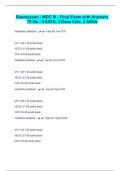
-
Rasmussen - MDC III - Final Exam with Answers 75 Qs - 5 SATA, 3 Dose Calc, 2 ABGs
- Exam (elaborations) • 14 pages • 2024
-
- $12.89
- + learn more
Rasmussen - MDC III - Final Exam with Answers 75 Qs - 5 SATA, 3 Dose Calc, 2 ABGs respiratory alkalosis - ️️ - high pH, low CO2 pH: 7.35-7.45 acidic-basic HCO3: 21-28 acidic-basic CO2: 45-35 acidic-basic metabolic acidosis - ️️ - low pH, low HCO3 pH: 7.35-7.45 acidic-basic HCO3: 21-28 acidic-basic CO2: 45-35 acidic-basic respiratory acidosis - ️️ - low pH, high CO2 pH: 7.35-7.45 acidic-basic HCO3: 21-28 acidic-basic CO2: 45-35 acidic-basic metabolic alkalosis - ️️ -...

-
Rasmussen - MDC III - Final Exam 75 Qs - 5 SATA, 3 Dose Calc, 2 ABGs
- Exam (elaborations) • 11 pages • 2023
-
- $12.00
- + learn more
respiratory alkalosis - high pH, low CO2 pH: 7.35-7.45 acidic-basic HCO3: 21-28 acidic-basic CO2: 45-35 acidic-basic metabolic acidosis - low pH, low HCO3 pH: 7.35-7.45 acidic-basic HCO3: 21-28 acidic-basic CO2: 45-35 acidic-basic respiratory acidosis - low pH, high CO2 pH: 7.35-7.45 acidic-basic HCO3: 21-28 acidic-basic CO2: 45-35 acidic-basic metabolic alkalosis - high pH, high HCO3 pH: 7.35-7.45 acidic-basic HCO3: 21-28 acidic-basic CO2: 45-35 acidic-basic ▪ change in condit...
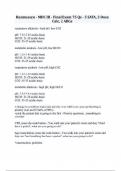
-
Rasmussen - MDC III - Final Exam 75 Qs - 5 SATA, 3 Dose Calc, 2 ABGs
- Exam (elaborations) • 11 pages • 2024
-
- $12.00
- + learn more
respiratory alkalosis - high pH, low CO2 pH: 7.35-7.45 acidic-basic HCO3: 21-28 acidic-basic CO2: 45-35 acidic-basic metabolic acidosis - low pH, low HCO3 pH: 7.35-7.45 acidic-basic HCO3: 21-28 acidic-basic CO2: 45-35 acidic-basic respiratory acidosis - low pH, high CO2 pH: 7.35-7.45 acidic-basic HCO3: 21-28 acidic-basic CO2: 45-35 acidic-basic metabolic alkalosis - high pH, high HCO3 pH: 7.35-7.45 acidic-basic HCO3: 21-28 acidic-basic CO2: 45-35 acidic-basic ▪ change in condit...
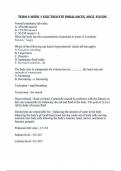
-
TERM 4 WEEK 1 ELECTROLYTE IMBALANCES, ABGS, FLUIDS
- Exam (elaborations) • 8 pages • 2024
-
- $11.00
- + learn more
Normal osmolarity lab value A. 450-600 mosm/l B. 270-300 mosm/l C. 50-250 mosm/l - b. When the body has this concentration of particles to water, it is isotonic Isotonic= happy Which of the following can lead to hypovolemia? (select all that apply) A. Excessive sweating B. Large burns C. Diuretics D. Inadequate fluid intake E. Increased urination - all The body tries to compensate for volume loss by ________ the heart rate and strength of contractions. A. Increasing B. Decreasing ...
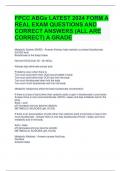
-
FPCC ABGs LATEST 2024 FORM A REAL EXAM QUESTIONS AND CORRECT ANSWERS (ALL ARE CORRECT) A GRADE
- Exam (elaborations) • 5 pages • 2024
- Available in package deal
-
- $14.29
- + learn more
FPCC ABGs LATEST 2024 FORM A REAL EXAM QUESTIONS AND CORRECT ANSWERS (ALL ARE CORRECT) A GRADE Metabolic System (BASE) - Answer-Kidneys help maintain a constant bicarbonate (HCO3) level Bicarbonate is the body's base Normal HCO3 level: 22 - 26 mEq/L Kidneys also eliminate excess acid Problems occur when there is Too much acid (other than CO2) accumulated in body Too much acid (other than CO2) lost from the body Too much bicarbonate taken into the body Too much much bicarbonate...
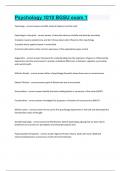
-
Psychology 1010 BGSU exam 1 Questions and answers latest update
- Exam (elaborations) • 8 pages • 2024
- Available in package deal
-
- $14.99
- + learn more
Psychology 1010 BGSU exam 1 Questions and answers latest update
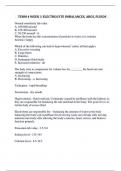
-
TERM 4 WEEK 1 ELECTROLYTE IMBALANCES, ABGS, FLUIDS
- Exam (elaborations) • 8 pages • 2023
-
- $10.00
- + learn more
Normal osmolarity lab value A. 450-600 mosm/l B. 270-300 mosm/l C. 50-250 mosm/l - b. When the body has this concentration of particles to water, it is isotonic Isotonic= happy Which of the following can lead to hypovolemia? (select all that apply) A. Excessive sweating B. Large burns C. Diuretics D. Inadequate fluid intake E. Increased urination - all The body tries to compensate for volume loss by ________ the heart rate and strength of contractions. A. Increasing B. Decreasing ...
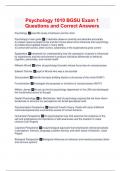
-
Psychology 1010 BGSU Exam 1 Questions and Correct Answers
- Exam (elaborations) • 6 pages • 2024
- Available in package deal
-
- $8.99
- + learn more
Psychology scientific study of behavior and the mind Psychology's main goals 1) describe-observe carefully and describe accurately 2) explain-reasons people know and don't know about what influences their psychology 3) predict-direct applied impact in many fields 4) control-self-control, other-control, awareness of the explanations gives control Epigenetics framework for understanding how the expression of genes is influenced by experiences and the environment to produce individual differenc...
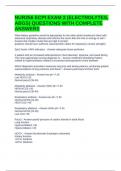
-
NUR256 ECPI EXAM 2 (ELECTROLYTES, ABGS) QUESTIONS WITH COMPLETE ANSWERS
- Exam (elaborations) • 10 pages • 2024
- Available in package deal
-
- $15.49
- + learn more
NUR256 ECPI EXAM 2 (ELECTROLYTES, ABGS) QUESTIONS WITH COMPLETE ANSWERS
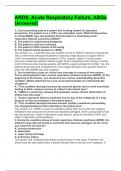
-
ARDS, Acute Respiratory Failure, ABGs (Answered)
- Exam (elaborations) • 11 pages • 2024
-
- $10.98
- + learn more
ARDS, Acute Respiratory Failure, ABGs (Answered) 1.) You're providing care to a patient who is being treated for aspiration pneumonia. The patient is on a 100% non-rebreather mask. Which finding below is a HALLMARK sign and symptom that the patient is developing acute respiratory distress syndrome (ARDS)?* A. The patient is experiencing bradypnea. B. The patient is tired and confused. C. The patient's PaO2 remains at 45 mmHg. D. The patient's blood pressure is 180/96. The answer is C....

That summary you just bought made someone very happy. Also get paid weekly? Sell your study resources on Stuvia! Discover all about earning on Stuvia


